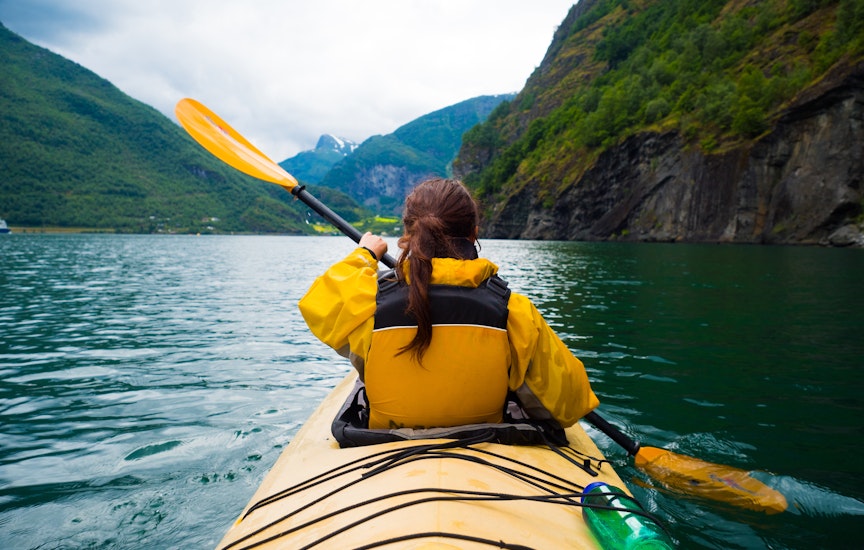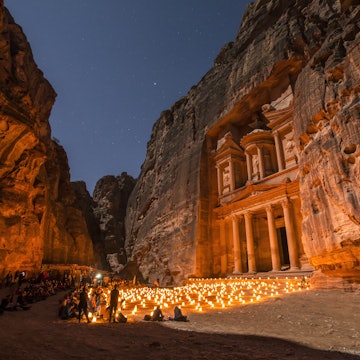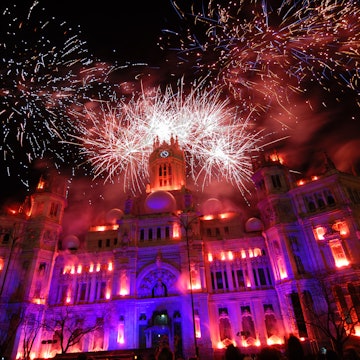

Riddu Riđđu Festivála may bring the rain sometimes but it also boasts Indigenous performers from all over the world © Alexander Benjaminsen/Visit Norway
Northern Norway is home to the Indigenous Sámi, a people whose lives are centered around the spectacular and vast natural backdrop of the Far North.
There are myriad Sami-led tour companies in the region to learn more and experience some of their culture. As well as a genuine eagerness to engage every visitor, expect to be offered delicious local Sámi food served under a blanket of starry skies and Northern Lights.
Whether it’s silence and solitude you’re seeking or an itinerary of action-packed activities, we cover the best places to explore and appreciate Sámi communities and culture in Norway.
Note: place names can differ in Sámi and Norwegian. In this article, we use the Sámi names, with Norwegian in brackets afterward.
Who are the Sámi?
The Sámi are the Indigenous people of Northern Europe. Their traditional regions stretch over Northern Sweden and Finland, the North-Western corner of Russia, the Northern half of Norway and some of the southeast.
The Sámi have a stronger legal standing in Norway than in the other countries, with Sámi being an official language alongside Norwegian, a Sámi parliament (with counterparts in Sweden and Finland), and laws to strengthen, protect and develop Sámi languages (there are ten), plus Sámi culture and communities.
Where to experience Sámi art and culture in Norway

After 150 years of assimilation policies which officially ended in the 1960s – but are perceived by many Sámi to have been effective – some areas have experienced a thriving revitalization of Sámi clothing, food, religion and philosophy. But at the same time, Sámi areas are increasingly attractive to mining and wind power companies. The result is the struggle and demonstrations against the Norwegian government which has allowed access to land used by Sámi for traditional reindeer husbandry, for example.
The cultural revitalization we have seen for the last forty years has created a new pride in the Sámi people and has made this fascinating culture more accessible for visitors. Community-led Sámi experiences are offered throughout a large part of Norway but the center of gravity for the culture is in the North.
Roadtrip ancient Sámi origins along Norway's coast
Start your explorations of the origins of Sámi culture in the northernmost county in Norway, Finnmark. Fly to Girkonjárga (Kirkenes in Norwegian), get a rental car, and take the scenic 90-minute drive to Vuonnabahta (Varangerbotn), passing nature reserves, fjords and coastal scenes. The coastal Sámi culture is epitomized by a combination of fishing and small farms.
Head to the Várjjat Sámi Musea for an interesting overview, with history exhibits, examples of traditional housing, and the fish and animals that made the basis for Sámi livelihood. The museum also has a nice shop of souvenirs and books if you’re interested to learn about the different Sámi cultures.
Where to find myth and legend in Norway's wildest landscapes

See the archaeological site of Ceavccegeađge (Mortensnes)
Twenty kilometers east of the museum is Ceavccegeađge (Mortensnes), where archaeological findings can trace human presence here back 10,000 years. That long ago one can’t determine specific ethnic traits, but we know traits of Sámi culture appear from approximately 2000 years ago, and traces of burial sites and settlement continue right up to today’s Sámi population.
The area is covered in snow in the winter, but from May to October you can follow the tracks and signs from the parking lot to see sites of early settlements and a sacrificial stone in the middle of a labyrinth made of small stones. The phallic stone was placed there some hundreds of years ago, as a place of sacrifice for fishing and hunting luck.
Hear traditional Sámi singing at Kjøllefjord
If you would like to see more of the coastal side, head further north to Gilevuotna (Kjøllefjord), a fishing village close to the reindeer’s summer grazing. Davvi Sámi Siida offers various delicious dishes with the season’s reindeer meat, alongside storytelling with luohti (also called yoik), the traditional Sámi singing style.
The accommodation here is also traditional; perhaps a night in a lávvu, the Sámi’s traditional summer tent, is tempting? In the wintertime, comfortable cabins are a better choice. The area is also great for hiking, skiing and fishing in lakes or the sea.
Moving mountains: Norway’s top 9 hikes

Contemporary Sámi art on the tundra
The highlands and the tundra are the heartlands of the northern Sámi reindeer lifestyle. On your way from the coast, stop at Sámi Dáiddaguovddáš (Sámi Center for Contemporary Art) in Kárášjohka (Karasjok). They have changing and diverse exhibitions throughout the year by Sámi visual artists, including installations, painting, video, photography, textiles and sculpture. While many Sámi artists today are rooted in ancient traditions when it comes to techniques and materials, others are totally modern in their expressions. At the center, you can also find a good selection of Sámi art books and music, both contemporary and traditional.
Reindeer, fjords and auroras: the 11 best national parks in Norway
Go for a free tour of the Sámi Parliament
On your way out of Kárášjohka (Karasjok), towards the beautiful river valley village of Máze (Masi), you’ll pass the Sámi Parliament building, with its recognizable lávvu-shaped architecture. Hop on a guided free tour every Tuesday, Wednesday or Thursday at 1 pm, except in the weeks when the parliament assembles (check the calendar online for details).

River safaris and resisting hydropower in Masi
With an almost exclusive Sámi population, many living a reindeer-herding lifestyle, Máze itself is a quiet spot between the city Áltá (Alta) and the town Guovdageaidnu (Kautokeino). It is also home to reindeer herder Johan P. Eira and his Sautso Safari. In the summer half of the year, he welcomes groups on a guided river safari to a gigantic hydropower dam, telling the story of the fifty-year-old struggle to save the river, and how it almost put the whole village underwater.
Afterward, he lights a cozy fire in the lávvu and tells stories about Sámi culture and serves reindeer meat. Can you imagine snow whipping in your face, as you’re cuddled up in a big fur coat on a sleigh pulled by four racing reindeer? Well, your dream can come true, as Sautso Safari gives the bolder visitor an action-filled winter experience with reindeer sledding on the frozen river.
Modern lávvu-shaped Sámi architecture
The Sámi reindeer culture is also central for the family-run Sámi Siida company a few kilometers from the center of Áltá. At their restaurant, the combination of a modern lávvu-shaped building with gourmet-style traditional Sámi dishes is a winner. Savory smoked reindeer meat and sweet cloudberry desserts are just some of the dishes on the menu. Getting within the cuddling distance to the reindeer, just outside, will win adults and children over. Don’t worry, reindeer never use their antlers on people, only other reindeer when they fight in the mating season.
Driving Norway’s west coast through wild fjords and engineering marvels

Festivals, fishing and alpine pleasures
Every year, Olmmáivággi (Manndalen), between Áltá and Romsa (Tromsø), hosts the International Riddu Riđđu Festivála. The festival name means ‘little storm on the coast’ in northern Sámi, but has a down-to-earth, relaxed atmosphere. Both Sámi and other Indigenous artists from around the world perform at the festival in mid-July, in addition to art exhibitions, theatre plays, dance shows, handicraft workshops, local food and workshops. The emphasis is more on family activities and there is a quiet family camp. But for revelers, there is plenty of beer and a regular camping site for the late-night dwellers.
The rest of the year, you can go sea fishing at Manndalen Sjøbuer. Rent a luxurious cabin and a fishing boat, and you’re set for a coastal Sámi experience. The lucky fisherman (or -woman) can bring home big cod or halibut. Why not combine your fishing trip with a bird-watching experience? Have your camera ready to try and spot sea eagles. Alpine pleasures in the nearby Lyngen mountains include both off-piste ski touring and randonée (cross-country skiing).

Chasing the Northern Lights near Tromsø and Lofoten
Going further south to the biggest city in the region, Romsa (Tromsø), will offer you a more metropolitan experience. Visit Tromsø Arctic Reindeer to go reindeer sledding under the Northern Lights, followed by relaxation in the goahti (a cone-shaped building) with a three-course dinner. The large herd stays outside in the area, so you should have opportunities to photograph and feed the reindeer, too.
If you want a more speedy and modern adventure, you can book short or long trips on snowmobiles from Romsa, Áltá or Guovdageaidnu or various smaller villages. Chasing the Northern Lights in the middle of the night will get your pulse racing. With a local guide who always follows the trails, you’ll feel completely safe. Ask in the hotel lobby where you’re staying, and they’ll be happy to make arrangements for you.
If you’re headed to Lofoten in Nordland to see the Northern Lights, make a stop at Inga Sámi Siida close to Suorttá (Sortland). They have a variety of accommodation, from glamping tents to a traditional lávvu tent, parts of their reindeer herd close by, and serve traditional Sámi food as well.
Catch the Northern Lights from your ice hotel: Norway's Far North is the ideal winter playground
Southern Sámi communities of Nordland and Trøndelag
Let’s not forget the south Sámi communities in the southern parts of Nordland and Trøndelag. Saemien Sijte is a south Sámi museum and cultural center in Snåase (Snåsa), a three-hour drive north of the city of Tråante (Trondheim).
In late August 2022, you can experience Tjaktjen Tjåanghkoe, a festival that celebrates south Sámi culture and language, with food, markets and music. It alternates every other year with the other south Sámi festival, Raasten Rastah in Plassje (Røros), a two-hour drive south of Tråante (Trondheim).

If you don’t happen to be in a south Sámi area during the festivals, try a dish of reindeer or fish in the local restaurants, that’s guaranteed to be from the area. Just like in the north, the foundation of the south Sámi kitchen is reindeer meat, a variety of fish from rivers, lakes and the sea, and sweet cloudberry or tangy lingonberry.
Nature in Norway has little pollution and because the reindeer graze all year in the mountains, forests or islands, they rarely eat concentrated fodder. The Sámi reindeer families take great pride in having fat, healthy reindeer that make tasty, tender meat, an ecological and renewable resource appreciated by the Sámi people themselves, Norwegians and visitors.
You might also like:
Do you need a visa to travel to Norway?
Explore Norway’s otherworldly sights and scenery on its best driving roads
13 essential Norway experiences: from cruising the fjords to wild camping
Norway is on our 2022 Best in Travel list. For more stories from some of the world’s most exciting destinations click here.
Safety recommendations and restrictions during a pandemic can change rapidly. Lonely Planet recommends that travelers always check with local authorities for up-to-date guidance before traveling during Covid-19.















